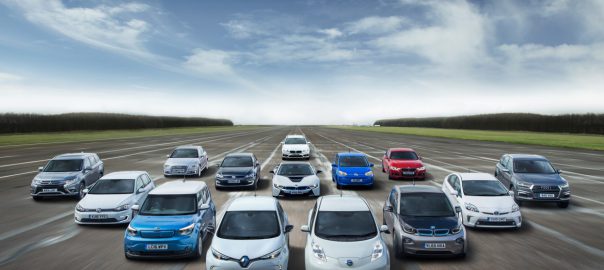Electric Car Sales Boom As UK Vehicle Sales Hit a 12-Year High
The popularity of the electric car has increased exponentially in recent years, with projections of 2 million electric cars shortly on the world’s roads (Guardian, 2016). This in turn has seen many adaptations such as charging points at service stations and even fast-food chains – benefiting those already owning an electric car, as well as attracting those thinking about making the switch. Further evidence of this rise is the news of the record sales of vehicles and a 12 year high in car registrations – which was aided by the surge of purchases in electric vehicles.

January 2017 saw 174,564 cars being registered across the UK, up 2.9 per cent when compared with the previous year, and the highest monthly level since 2005 (Guardian, 2017). The Society of Motor Manufacturers and Traders (SMMT) also announced that electric vehicles took a record share in the sales market. Looking at the underlying figures, it is clear to see how alternative fuel cars are helping with this surge, especially electric cars like the new Nissan Leaf. This increased by a fifth and reached its greatest share of new vehicles registrations at 4.2 per cent, passing its previous 3.6 per cent high of November last year (Guardian, 2017).
“With the fluctuating cost of fuel, it is clear to see why motorists are opting for alternative fuel vehicles, where electricity prices are more stable”
There are a multitude of reasons why electric vehicles are leading the charge and steadily growing in the overall sales market. One of the main reasons, and alluded to earlier with the Nissan Leaf, is that no longer are electric cars a simplistic eyesore, but instead have increased in both style and scope. Drivers are now more attracted to alternative fuel cars as their appearance has evolved to be more like that of standard cars, as well as being cleaner and cheaper to run.
Almost mirroring the persistent rise in the cost of fuel is a further advantage to those thinking about purchasing an electric car: battery costs are down by 65 per cent from prices 5 years ago (CityAM).
As well as being cheaper, cleaner and more environmentally friendly, electric cars outclass internal combustion vehicles on a multitude of levels. Electric cars run more smoothly and have improved acceleration over their fuelled counterparts, as well as having significantly lower maintenance needs, and the scope for manufacturer modifications to be completed via software updates.
With four major world cities now actively moving to ban diesel vehicles by 2025 (BBC, 2016), and London looking increasingly likely to join this, alternative fuel vehicles will certainly continue to grow their share in the market. Major car companies are already altering their strategies to put electric vehicles at the center of their ranges, with Volkswagen planning to invest $11.2 billion over the course of the next decade to make electric cars 25 per cent of its total sales (CityAM, 2016). These latest trends and figures suggest that the sales of electric cars will continue to rise, with Bloomberg New Energy Finance (BNEF) forecasting that the sales of electric vehicles will account for 35 per cent of all new car sales by 2040.
Source: TryMyEV
